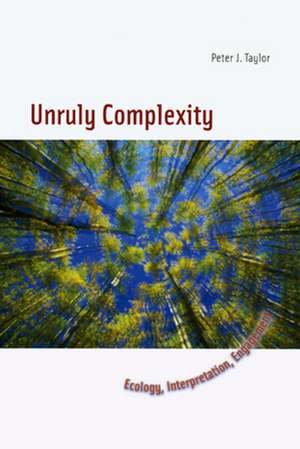Unruly Complexity: Ecology, Interpretation, Engagement
Autor Peter J. Tayloren Limba Engleză Paperback – 3 oct 2005
Ambitiously identifying fresh issues in the study of complex systems, Peter J. Taylor, in a model of interdisciplinary exploration, makes these concerns accessible to scholars in the fields of ecology, environmental science, and science studies. Unruly Complexity explores concepts used to deal with complexity in three realms: ecology and socio-environmental change; the collective constitution of knowledge; and the interpretations of science as they influence subsequent research.
For each realm Taylor shows that unruly complexity-situations that lack definite boundaries, where what goes on "outside" continually restructures what is "inside," and where diverse processes come together to produce change-should not be suppressed by partitioning complexity into well-bounded systems that can be studied or managed from an outside vantage point. Using case studies from Australia, North America, and Africa, he encourages readers to be troubled by conventional boundaries-especially between science and the interpretation of science-and to reflect more self-consciously on the conceptual and practical choices researchers make.
For each realm Taylor shows that unruly complexity-situations that lack definite boundaries, where what goes on "outside" continually restructures what is "inside," and where diverse processes come together to produce change-should not be suppressed by partitioning complexity into well-bounded systems that can be studied or managed from an outside vantage point. Using case studies from Australia, North America, and Africa, he encourages readers to be troubled by conventional boundaries-especially between science and the interpretation of science-and to reflect more self-consciously on the conceptual and practical choices researchers make.
Preț: 318.10 lei
Nou
Puncte Express: 477
Preț estimativ în valută:
60.88€ • 63.07$ • 50.81£
60.88€ • 63.07$ • 50.81£
Carte tipărită la comandă
Livrare economică 22 martie-05 aprilie
Preluare comenzi: 021 569.72.76
Specificații
ISBN-13: 9780226790367
ISBN-10: 0226790363
Pagini: 232
Ilustrații: 2 halftones, 43 line drawings
Dimensiuni: 152 x 229 x 18 mm
Greutate: 0.42 kg
Ediția:New.
Editura: University of Chicago Press
Colecția University of Chicago Press
ISBN-10: 0226790363
Pagini: 232
Ilustrații: 2 halftones, 43 line drawings
Dimensiuni: 152 x 229 x 18 mm
Greutate: 0.42 kg
Ediția:New.
Editura: University of Chicago Press
Colecția University of Chicago Press
Notă biografică
Peter J. Taylor is associate professor and director of the Programs in Science, Technology & Values and Critical & Creative Thinking at the University of Massachusetts, Boston, where he teaches environmental studies, science studies, and reflective practice.
Cuprins
Acknowledgments
Prologue
Part I - Modeling Ecological Complexity
1. Problems of Boundedness in Modeling Ecological Systems
A. The Construction of Complexity
B. The Hidden Complexity of Simple Models
2. Open Sites in Model Building
Part II - Interpreting Ecological Modelers in Their Complex Social Context
3. Metaphors and Allegory in the Origins of Systems Ecology
A. Social-Personal-Scientific Correlations in the Work of H. T. Odum: A First Reading
B. Another Look: Diagrams and Physical Analogies
4. Reconstructing Heterogeneous Webs in Socio-Environmental Research
A. The Simulated Future of a Salt-Affected Agricultural Region
B. An Intersection of Domains of Action that Include MIT, USAID, System Dynamics Modelers, and Nomadic Pastoralists
Part III - Engaging Reflexively Within Ecological, Scientific, and Social Complexity
5. Reflecting on Researchers' Diverse Resources
A. Further Intersections that Affect Researchers and Interpreters Extending Their Webs
B. Workshops in which Ecologists Map Their Webs of Knowledge-Making
C. Two Terms that Help Researchers Conceptualize More Complexity
6. Reasoned Understandings and Social Change in Research on Common Resources: Introducing a Framework to Keep Tensions Active, Productive, and Ever-Present
A. Researchers Conduct a Dialogue, Involving Concepts and Evidence, with the Situations Studied
B. Socially Situated Researchers Interact with Other Social Agents to Establish What Counts as Knowledge
C. Researchers Pursue Social Change by Addressing Self-Consciously the Complexities of the Situations They Study and Their Own Social Situadness
Epilogue: Three Stories
A. Participation
B. Flexible Engagement
C. Open Questions
Summary of Themes and Questions Opened Up
Glossary
Notes
References
Index
Prologue
Part I - Modeling Ecological Complexity
1. Problems of Boundedness in Modeling Ecological Systems
A. The Construction of Complexity
B. The Hidden Complexity of Simple Models
2. Open Sites in Model Building
Part II - Interpreting Ecological Modelers in Their Complex Social Context
3. Metaphors and Allegory in the Origins of Systems Ecology
A. Social-Personal-Scientific Correlations in the Work of H. T. Odum: A First Reading
B. Another Look: Diagrams and Physical Analogies
4. Reconstructing Heterogeneous Webs in Socio-Environmental Research
A. The Simulated Future of a Salt-Affected Agricultural Region
B. An Intersection of Domains of Action that Include MIT, USAID, System Dynamics Modelers, and Nomadic Pastoralists
Part III - Engaging Reflexively Within Ecological, Scientific, and Social Complexity
5. Reflecting on Researchers' Diverse Resources
A. Further Intersections that Affect Researchers and Interpreters Extending Their Webs
B. Workshops in which Ecologists Map Their Webs of Knowledge-Making
C. Two Terms that Help Researchers Conceptualize More Complexity
6. Reasoned Understandings and Social Change in Research on Common Resources: Introducing a Framework to Keep Tensions Active, Productive, and Ever-Present
A. Researchers Conduct a Dialogue, Involving Concepts and Evidence, with the Situations Studied
B. Socially Situated Researchers Interact with Other Social Agents to Establish What Counts as Knowledge
C. Researchers Pursue Social Change by Addressing Self-Consciously the Complexities of the Situations They Study and Their Own Social Situadness
Epilogue: Three Stories
A. Participation
B. Flexible Engagement
C. Open Questions
Summary of Themes and Questions Opened Up
Glossary
Notes
References
Index
